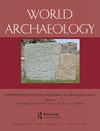You can’t perform the same ritual twice: minds, materials, automobiles, and the emergence of form
IF 1.5
2区 历史学
0 ARCHAEOLOGY
引用次数: 2
Abstract
Following Gosden and Malafouris, this article explores why process archaeology provides a beneficial framework for understanding the emergent, selforganising dynamics of human existence. To demonstrate the potential of process archaeology for reframing discourses about humanity’s nature, this article examines automotive culture from evolutionary, ecological, developmental, and socio-political perspectives. Automobiles provide a robust example of how forms emerge from and transform flows of energy-matter across multiple dynamic scales. The article concludes with a reflection on symbolism and how American automotive culture can be understood as a form of cult ritual. Archaeology’s obsession with ritual stems from a Cartesian assumption that rituals are arbitrary manifestations of symbolic minds. Process archaeology understands ritual as a means of organising energetic flows of persons and things into stable forms that endure over time. This perspective supports exploring the emergence of symbolic relationships and cultural forms as a developmental entwining of cognitive and ecological processes.你不能进行两次相同的仪式:思想,材料,汽车,和形式的出现
继Gosden和Malaforis之后,本文探讨了为什么过程考古学为理解人类存在的涌现、自组织动力学提供了一个有益的框架。为了证明过程考古学在重新构建关于人类本质的话语方面的潜力,本文从进化、生态、发展和社会政治的角度考察了汽车文化。汽车提供了一个强有力的例子,说明形式是如何在多个动态尺度上从能量物质流中产生并转化的。文章最后对象征主义以及如何将美国汽车文化理解为一种崇拜仪式进行了反思。考古学对仪式的痴迷源于笛卡尔的一种假设,即仪式是象征性思维的任意表现。过程考古学将仪式理解为一种将人和物的能量流动组织成稳定形式的手段,这种形式会随着时间的推移而持续。这种观点支持探索象征关系和文化形式的出现,作为认知和生态过程的发展交织。
本文章由计算机程序翻译,如有差异,请以英文原文为准。
求助全文
约1分钟内获得全文
求助全文
来源期刊

WORLD ARCHAEOLOGY
ARCHAEOLOGY-
CiteScore
2.60
自引率
0.00%
发文量
32
期刊介绍:
World Archaeology was established specifically to deal with archaeology on a world-wide multiperiod basis. Thirty years after it was founded it remains a leader in its field. The first three of the year"s quarterly issues are each dedicated to a particular theme of current interest. The fourth issue, Debates in World Archaeology, is a forum for debate, discussion and comment. All papers adopt a broad comparative approach, looking at important issues on a global scale. The members of the editorial board and the advisory board represent a wide range of interests and expertise and this ensures that the papers published in World Archaeology cover a wide variety of subject areas.
 求助内容:
求助内容: 应助结果提醒方式:
应助结果提醒方式:


